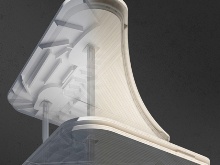Performative Morphology
ICD/ITKE Research Pavilion 2020/21
Current wood building systems are defined by their modular nature. Even though engineered wood processes open up the fabrication of modules of almost unlimited size and shape, the requirements of transportation and ease of on-site assembly greatly limit the complexity and scale of these systems, and the resulting buildings. The anisotropic nature of timber fibres limits most structures to be uni-directional creating mostly rigid grid structures and designs. Recent developments in computational design methods, material science and fabrication techniques open up new possibilities to overcome these technical limitations. Previously, students investigated modular robotic fabrication and assembly processes for timber, alongside material systems, and design, engineering and service integration methods for multi-storey timber construction within a network-based ordering system framework. They also examined a set of state-of-the-art contemporary case studies which they positioned within the larger disciplinary context. They will be required to build upon previous research regarding modular robotic fabrication and assembly processes of timber members and explore their application in interdisciplinary teams at an architectural scale. The aim of the studio will be to explore new typologies and morphologies for a multi-storey structure, and to propose new organisation strategies and design solutions for a more flexible and multi-purpose use of space. The project offers the opportunity to apply computer-based design, planning, calculation, and production methods in an integrated design process at an architectural scale. The focus will be on the refinement of the proto-architectural timber post and slab building system concept developed in 2019/20. Due to the online-teaching format, the studies will be complemented by smaller ‘in-person’ group sessions.
ICD/ITKE Research Pavilion 2020/21
Current wood building systems are defined by their modular nature. Even though engineered wood processes open up the fabrication of modules of almost unlimited size and shape, the requirements of transportation and ease of on-site assembly greatly limit the complexity and scale of these systems, and the resulting buildings. The anisotropic nature of timber fibres limits most structures to be uni-directional creating mostly rigid grid structures and designs. Recent developments in computational design methods, material science and fabrication techniques open up new possibilities to overcome these technical limitations. Previously, students investigated modular robotic fabrication and assembly processes for timber, alongside material systems, and design, engineering and service integration methods for multi-storey timber construction within a network-based ordering system framework. They also examined a set of state-of-the-art contemporary case studies which they positioned within the larger disciplinary context. They will be required to build upon previous research regarding modular robotic fabrication and assembly processes of timber members and explore their application in interdisciplinary teams at an architectural scale. The aim of the studio will be to explore new typologies and morphologies for a multi-storey structure, and to propose new organisation strategies and design solutions for a more flexible and multi-purpose use of space. The project offers the opportunity to apply computer-based design, planning, calculation, and production methods in an integrated design process at an architectural scale. The focus will be on the refinement of the proto-architectural timber post and slab building system concept developed in 2019/20. Due to the online-teaching format, the studies will be complemented by smaller ‘in-person’ group sessions.


